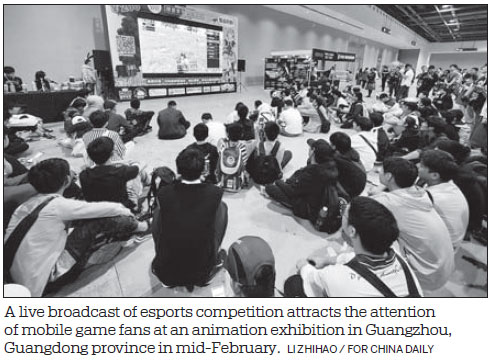Ban placed on games streaming in legal row
In a copyright case, Guangzhou Intellectual Property Court has granted an injunction against a video game livestreaming platform. It is the first of its kind in the industry in the country, Chinese media reported.
The injunction was issued at the end of January and remains until the court makes a final ruling. It involves Honor of Kings, a hit mobile game developed by internet giant Tencent, headquartered in Shenzhen, Guangdong province.
It ordered three companies - Yuncheng Yangguang Cultural Media, news feed Jinri Toutiao and the latter's parent company Byte-Dance - to stop live broadcasting the game on the Xigua video app, also owned by ByteDance.

"The injunction is a demonstration (of similar cases) related to game livestreaming businesses," Cong Lixian, an IP professor at East China University of Political Science and Law, told Legal Daily.
While it is targeted at just one game in this case, the court decision has made it clear that without authorization of related copyrights, video portals cannot operate game livestreaming business, Cong said.
The ruling came after Tencent, the copyright owner of Honor of Kings, filed a complaint with the Guangzhou court against the three companies in November 2018. It claims they had infringed the game's copyright.
Xigua posted on its website last year to recruit game show hosts for live broadcasts of Honor of Kings gameplay.
Tencent told the court that the defendants profited by livestreaming the game without permission.
In their defense, the three companies claimed that the copyright is in dispute as game livestreaming is an emerging type of business.
The court found that Xigua video app set up a livestreaming channel and organized live broadcasts of Honor of Kings, rather than serving as a platform for online gamers' own shows.
The unauthorized operation injured the plaintiff's interest and seized shares of the game livestreaming market and user base, Legal Daily quoted the judges as saying when they issued the injunction in a primary ruling.
The case is still pending further investigation.
The court case is one episode in the ongoing saga of legal disputes between Tencent and ByteDance.
In June 2016, ByteDance sued Tencent, alleging the latter to have been involved in unfair competition and claiming 90 million yuan ($13.38 million) in damages.
As a legal remedy aimed at preventing unenforceable judgments, an injunction has long been available for judicial protection in the IP sphere, Zhao Hu, a partner of Beijing Zhongwen Law Firm, told the Economic Observer newspaper.
A court is likely to issue an injunction if it has found there is a high chance of infringement and that the suspected infringement is ongoing, Zhao said.
A study by market consultancy iResearch shows that the average life span for a mobile game is around one year. But it took one to three years to make a final judgment in previous cases involving game livestreaming, Economic Observer reported.
Data from the Ministry of Industry and Information Technology show that China's online game sector generated 111.3 billion yuan in the first seven months of last year.
As the industry is gaining momentum, disputes over game livestreaming are on the rise.
In November 2014, major dotcom company NetEase filed another game livestreaming copyright complaint with the Guangzhou court against Guangzhou Huaduo Network Technology.
The court ruled in favor of NetEase, yet both the plaintiff and defendant lodged an appeal with the Guangdong High People's Court.
The appeal court sat to hear the case in April 2018 and the case is still pending.
(China Daily 02/21/2019 page17)














